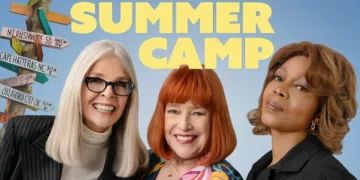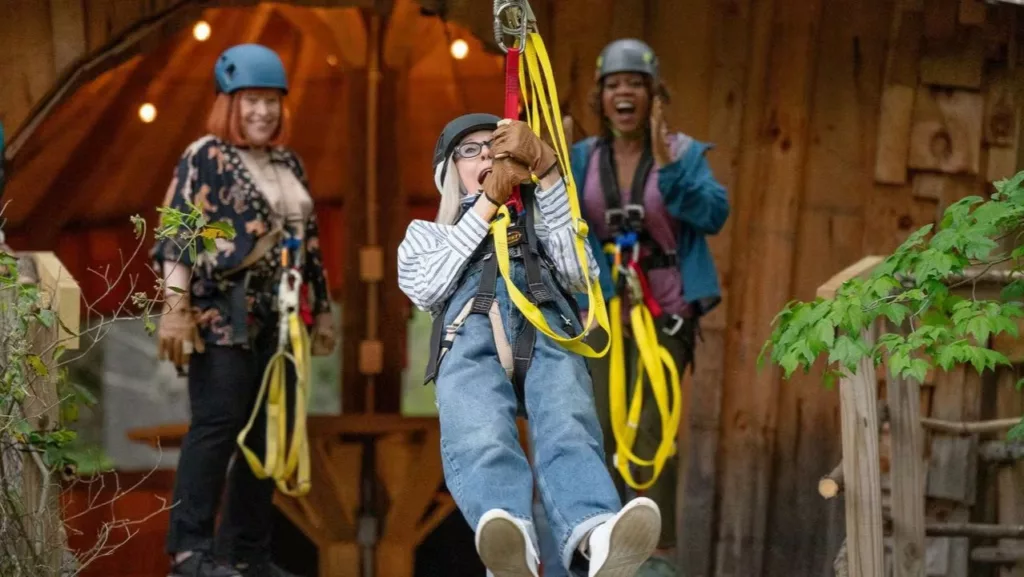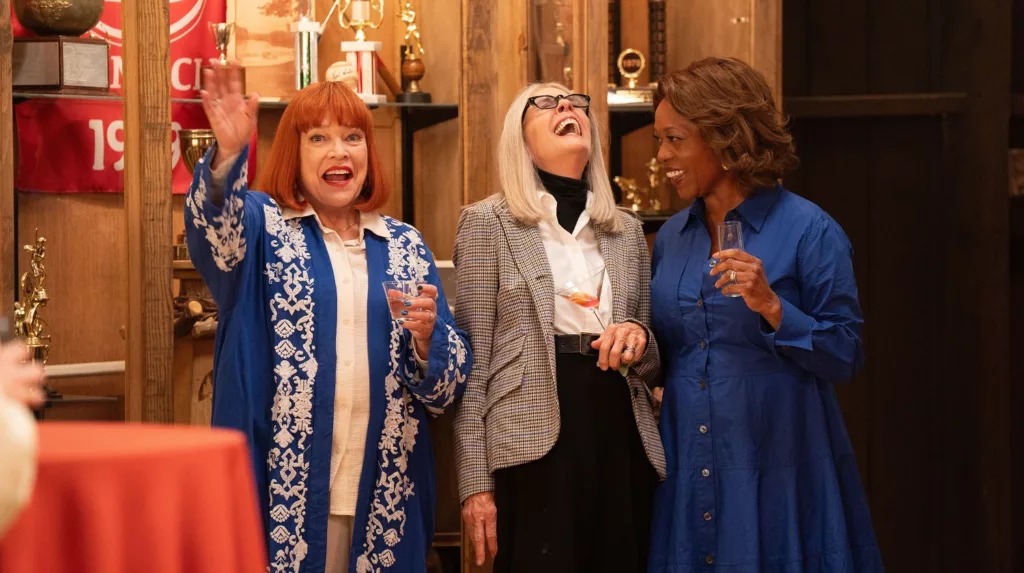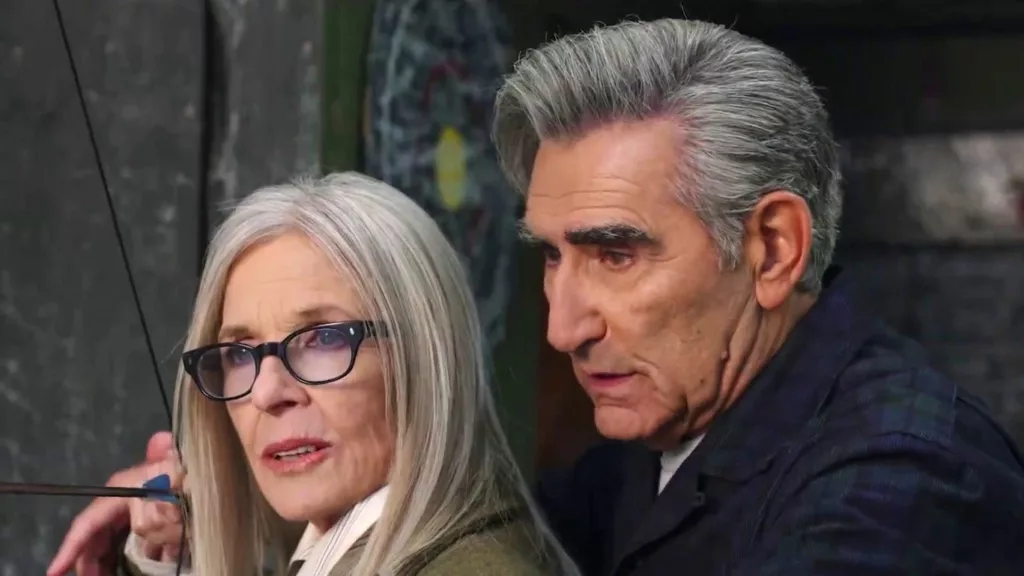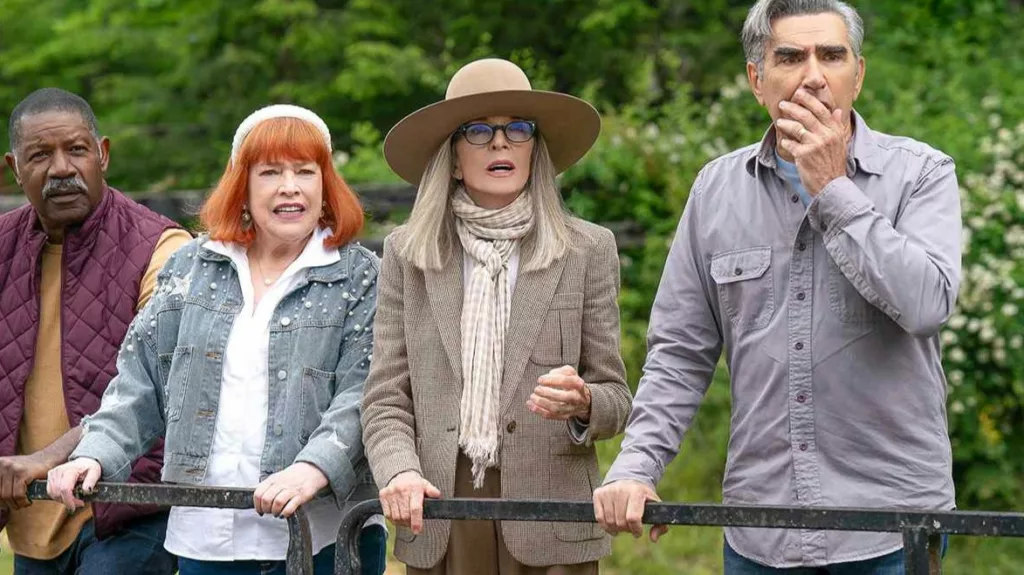Nostalgia was likely the initial draw for Diane Keaton, Kathy Bates, and Alfre Woodard to sign on to Castille Landon’s comedy Summer Camp. The film tells the story of three women—Nora, Ginny, and Mary—whose lifelong friendship began as campers at a sleepaway summer retreat in their youth. Over 50 years later, Ginny orchestrates a reunion that brings the trio back to relive memories of their girlhood summers.
With its all-star cast and light premise offering a chance to reminisce on carefree days gone by, Summer Camp had the potential to provide easy entertainment. However, talented as the leading ladies are, even they could only do so much to buoy Landon’s lackluster screenplay and limp directing. From the first scenes, the characters lack nuance, and the story feels skewed toward unimportant hijinks over genuine humor or emotional depth.
As the reunion unfolds, schtick overwhelms substance. Camp activities meant to stir nostalgia, like archery or pottery classes, serve only as vehicles for clumsy gags. Romantic plots feel hastily tacked-on. Supporting characters read as one-dimensional clichés. While flashes of the leads’ talent shine through, they’re hampered by thin material that renders their talents mere window-dressing for a predictable story audiences have seen too many times.
With its A-list cast and capable hands behind the camera, Summer Camp seemed poised to be a sweet summer delight. Unfortunately, even star power isn’t enough to salvage a script and vision that fail to meaningfully capture the charm of rediscovering youth’s carefree days among good friends. When the credits roll, it’s no surprise that the film leaves little impression or incentive to relive its underwhelming experience again.
Summer Nostalgia at Camp Pinnacle
It’s been fifty years since Ginny, Nora, and Mary first met as campers at North Carolina’s Camp Pinnacle. Ginny has always felt their weeks there were the best of her life, bonding her with her two closest friends. As the years passed, jobs and families kept the three busy in different cities. But Ginny hasn’t forgotten those formative summers or the strength of their childhood bond.
She decides it’s time to recapture some of that magic and organizes the first-ever Camp Pinnacle reunion. Naively believing a week of summer activities will transport them back to simpler times, Ginny convinces Nora and Mary to join her. Nora now runs her own company as a widow, keeping herself busy to avoid facing her lonely personal life. Mary continues her career as an ER nurse but finds less fulfillment at home with her husband.
At the reunion, some familiar faces appear, including Eugene Levy’s charming retired businessman Stevie D. and Dennis Haysbert as the good-natured Tommy. Both knew the women decades ago and seem interested in rekindling past sparks. The camp is led by Josh Peck’s enthusiastic but clumsy counselor and Nicole Richie’s mellow assistant. Their attempts to entertain the aging crowd with archery, zip-lining, and other games prove more alarming than fun.
The film gestures toward themes of reigniting old friendships, finding purpose in later years, and accepting life’s changes. But the characters remain thinly drawn, and their attempts to reconnect feel stagnant and unrealistic.
While the leading ladies’ talents keep things watchable, the shallow story does little service to their moving portrayals of women navigating relationships, careers, and self-discovery past 50. For these veterans, simpler roles that allow their nuanced skills to shine would better suit their talents.
Missed Opportunities
Castille Landon’s direction for Summer Camp lacks the vitality and fresh perspective needed to elevate its predictable script. From the first frames, an anxious enervation is apparent. Reaction shots are hurried where breaths could enhance rapport. Transitory edits rush conversations that require patience to unfold naturally.
Karsten Gopinath’s outdoor cinematography is admirable yet distressed. Sweeping camping countrysides and dense woodlands go neglected for interiors. There, functional lighting and decor fail to showcase character or setting. Dorms feel empty, though populated. Craft services outshine activities’ preparations.
Tom Howe’s score strains, inviting carefree glee from scenes demanding gravity. At irresistible moments, chirpy plucked strings yank where subdued winds could soothe. Elsewhere, violins build improbable drama from scant lines. Music leads where content can’t follow, distorting tone.
In contrast, the production excels with nuanced actors. Kathy Bates, Alfre Woodard, and Eugene Levy imbue moments with wit and wisdom. Their delicate gestures speak volumes unsaid. But these pros require direction, cultivating comfort to communicate layers unwritten. Without space to explore, their gifts go undernourished, aiding a route script incapable of surprising or teaching as it plays out expected beats.
A surer hand might have cherished this cast, uplifting their characters beyond outlines through creative blocking, varied shots, and selective scoring. Such methods could have balanced sincere reflections with lightheartedness in a tale of rediscovery. But ultimately, Direction and Values herein remain as surface-level as its premise, missing opportunities to resonate on deeper wavelengths.
Pinnacle Players
Despite a lackluster production, the performances in Summer Camp are worthy of applause. Kathy Bates, Diane Keaton, and Alfre Woodard bring these long-time friends to a vibrant life. Their natural rapport carries the heart of the film, bolstered by the experience each actress lends to even the slightest of scenes.
Bates excels at channeling gutsy gumption through her character Ginny. Behind bombastic bravado lies genuine care for her family. She draws out nuances that elevate Ginny beyond boisterous bus tours and self-help sloganeering.
Keaton breathes restless spirit into uncertain Nora, unsure whether to cling to routine or risk joy. Subtle gestures speak volumes, as when lingering loneliness awakens her inner ingenuity. Woodard instills Mary with quiet conviction and nurturing strength, residing deeper than duty allows her to reach. Together, this trio transforms surface details into an engrossing study on the resilience of sisterhood.
Supporting players adds additional flair. Eugene Levy offers Nora a calm harbor, his natural poise balancing her tides. Dennis Haysbert brings Tommy’s gentle grace to vibrant life. Nicole Richie and Josh Peck bring youthful spirit to seasoned surroundings. Their lighter charms provide humor where others find none.
Yet even skills this refined stretch only so far. Flaws in character and clip show pacing curb moments that could have soared. Talents of this caliber deserve scripts honoring their full gifts. Where jokes fall flat and arcs feel rushed, one longs to set these performers free upon works better celebrating their prowess. For now, we applaud their triumph over lesser material, with performances truly befitting Camp Pinnacle’s most prized players.
Summer Camp’s Quest for Laughter Falls Short
While Summer Camp brings together a stalwart comedic troupe, much of the film’s attempts at humor feel strained and miss their mark. The movie strives for a lighthearted tone through physical slapstick and zingy one-liners, yet these efforts often undermine its own comedy through forced sentimentality or ill-conceived gags.
Some of the biggest stars in business trade barbs as their characters, yet the rapid-fire dialogue rarely elicits more than a polite chuckle. The cleverness of the insults and retorts feels stifled by an insistence on glossing over deeper issues.
In one scene, a character bluntly calls out another’s toxic behavior, but the confrontation quickly melts into hugs and smiles with no real resolution. This shortcuts potentially rich comic tension in favor of easy feel-good optics.
Similarly, set pieces meant to elicit laughs through pratfalls and mishaps tend to leave the viewer more bemused than amused. Characters launch themselves down ziplines or into rafting expeditions with little regard for safety or common sense, yet the physical comedy lacks the gleeful abandon that makes such bits sing in kindred fare like Beethoven or European Vacation. When Woodard winds up splattered in pie during a food fight, it feels less like madcap fun than a tired callback to cinematic conventions far past their due date.
In contrast, films like Book Club or even Veep find comedy in genuinely witty quips or fully-formed characters acting in recognizable—if zany—ways. Their humor emerges organically from situations rather than being grafted on through clunky slapstick or one-dimensional caricatures.
By taking their characters and their circumstances more seriously, these comedies allow fully formed stars like Julia Louis-Dreyfus or Candice Bergen to flex their comedic chops with nuance rather than broad gestures. For Summer Camp’s estimable leads, a bit of this subtlety could have gone a long way.
Overall, Summer Camp shows how difficult balancing laughs and feelings can be, even for seasoned pros. With just a bit more believability and willingness to play against expectations, it could have been a lighter pleasure rather than a disappointing miss for its talented troupe. As is, the movie’s grasp of humor too often falls short of launching its laughs.
Comedy and Heart: Striking the Right Balance
The themes of friendship, aging, and life’s journeys in Summer Camp suggest profundity, but ultimately fall short of truly exploring them. At its core is the bond between three women who supported each other as youths, seeking that comfort once more as seniors. But beyond reuniting, the movie only teases examining their evolving dynamic and individual experiences, from marriage and career choices to loneliness.
Compare it to works like Tully or The Good Wife, digging thoughtfully into motherhood’s toll, or Still Alice, painting Alzheimer’s with empathy, not exploitation. These steer clear of stereotypes to showcase humanity within characters. Summer Camp, while boasting talented actresses, reduces them to boxes to be ticked—the friendly mom, busy widow, and lone wolf—with papery arcs left unfinished.
Woodard and Bates in particular offer glimpses of longing and regret beyond their roles, only for the film to rush past predictable obstacles and resolutions. It squanders opportunities by focusing on silly hijinks over real exchanges that could resonate. Even the supporting folks feel underwritten; their presence raises intriguing possibilities that are then ignored.
Ultimately, Summer Camp fritters away its formidable ensemble on a contrived script with no insight to explore. It settles for cliche, where it could delve meaningfully into the issues so many face. In aiming for easy laughs over substance, the movie overlooks the poetry it might have unearthed within these lives and friendships. Its capable crew deserved material with far more heart and thought behind it.
Summer Camp’s Untapped Potential
This film brought together a powerhouse group of actors who deserved a story worthy of their talents. While their performances manage to entertain in glimpses, the script and direction fail to fully realize the charm we know this cast can deliver. Despite their best efforts, even comedy legends like Diane Keaton, Kathy Bates, and Alfre Woodard could only work so much magic within the limitations of flat characters and juvenile humor.
It’s easy to imagine a far more heartfelt experience if the material matched these performers’ skills. A few tweaks could have transformed familiar coming-of-age themes into a funny, poignant look at lifelong bonds between women.
Perhaps more depth to each role or genuine dramatic tension to balance hijinks. With Landon’s potential, as seen in projects like Fear of Rain, she seemingly had the ability to provide both laughs and insight.
Still, for light summertime viewing, it remains passable. Yet cinephiles hoping for a smarter alternative might find truer fun, feeling, and fulfillment in other films that deliver where Summer Camp fell short. Therein lay the missed opportunity—not in bringing these greats together, but in not doing their partnership justice. While predictability reigns, the cast still imbues enough spirit to remain the film’s saving grace.
The Review
Summer Camp
Summer Camp proved an unsatisfyingly superficial way to pair extraordinary talent. The project suggests amplifying what makes these performers shine rather than settling for caricatures in a contrived story. Yet despite a script failing to ignite real sparks, the enduring luminosity of Bates, Keaton, and Woodard still shines through at moments, preventing the film from becoming completely dim.
PROS
- The star power of Diane Keaton, Kathy Bates, and Alfre Woodard
- Scenic location shooting at Camp Pinnacle in North Carolina
- Glimpses of heart and humor from performances
CONS
- Predictable, thinly written characters and plot
- Forced, unfunny physical humor and slapstick
- Wasted potential of talented cast in lackluster material
